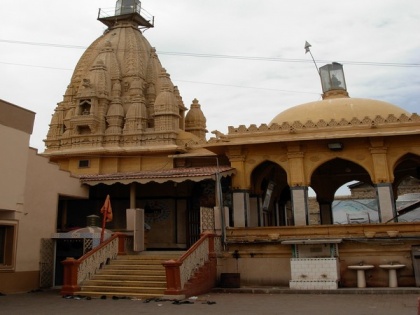Pakistani hate song exposes open bigotry for Hindu minorities over temple issue in Islamabad
By ANI | Published: July 12, 2020 02:46 PM2020-07-12T14:46:54+5:302020-07-12T15:05:06+5:30
Ever since work on Islamabad's first Hindu temple began earlier this month, many Pakistanis have been on a spree threatening their government of violence and spewing hate against Hindus.

Pakistani hate song exposes open bigotry for Hindu minorities over temple issue in Islamabad
Ever since work on Islamabad's first Hindu temple began earlier this month, many Pakists have been on a spree threatening their government of violence and spewing hate against Hindus.
A new hate song referring Pakist Hindus as 'Hindust kutton' (Indian dogs) has flooded the social media. The music video by an anonymous Pakist singer shows the footage of country's Army and threatens the Hindu minority community to stay in limits (raho aukat mei).
Halting the construction of a Shri Krishna Mandir in Islamabad's H-9 sector by local authorities last week is yet another reminder of how the space for religious freedoms is shrinking in Pakistan. The temple would have been the first new place of worship for the Hindus residing in the capital. But not anymore.
Marred with fatwas, religious bigotry, threats and political point-scoring, especially by Islamists in the Muslim majority nation, has driven the construction of the Hindu temple issue into new disputes.
On July 5, the local development authority in Islamabad stopped the construction of the boundary wall on the plot allotted to the 'Mandir'. According to the authority's spokesperson Mazhar Hussain, the action was taken because a building plan had not been submitted to the authority, as reported by The New York Times.
"Any construction taking place in Islamabad, residential or commercial, requires a building plan (map) to be approved," he was quoted as saying by local media.
When Pakistan's former government allotted land for the temple in 2018, Muslim demonstrators quickly camped out on the plot, refusing to allow a Hindu structure to be built in Islamabad, according to The New York Times.
But the temple's Hindu advocates seemed to prevail and the temple's first foundation stones were laid last month. Days later, Prime Minister Imran Khan ordered the government to provide about USD 1.3 million for the temple's construction, roughly a fifth of what is needed.
However, Muslim clerics stepped in again and things started changing.
Several clerics ruled that no Hindu temple should be built because Pakistan is a Muslim country. Citizens denounced the government for using their taxes to provide funds for the temple. Media outlets openly campaigned to shut the project down.
Under mounting pressure, the government late earlier this month backtracked from its initial pledge to donate money to the temple's construction, instead of asking for guidance from the Council of Islamic Ideology on whether to give the grant. The violence over the issue reached heights last Sunday when a group of men destroyed the partially constructed wall around the temple's land, claiming it was their Islamic duty to do so. They gleefully filmed their exploits and posted it on social media. Unfortunately, none of the vandals have been arrested.
In a matter of just weeks, the hope surrounding Islamabad's first Hindu temple was derailed, in a similar as many aspirations that the Imran Khan government had delivered on the religious coexistence when he had promised when he won elections in 2018, The New York Times reported.
As of now, the trespassers who no one is bothered to stop, desecrate the construction site, vandalise the temple's foundation, chant slogans and shoot videos of themselves offering namaz with great pride. All this when an already beleaguered Hindu community in the capital feels helpless and threatened by such behaviour.
In his election campaign, the cricketer-turned-politician had promised to improve conditions for Pakistan's religious minorities, often treated as second-class citizens and targetted in attacks by Islamic fundamentalists with few repercussions. He had also vowed to restore their places of worship.
Khan seemed to make good on his promise late last year when the government reopened one of Sikhism's holiest shrines, the 500-year-old Gurdwara Darbar Sahib Kartarpur. But the latest move over the construction of Hindu temple in the capital province once again marred efforts of Imran Khan's promise to religious tolerance.
Although Hindus are between two and four per cent of Pakistan's population, Islamabad does not have a temple for them to worship in. If their relatives die, they must travel long distances with the body to Hindu-run cremation facilities to perform traditional burial rites.
Pakistan's bias towards minorities has not surfaced overnight. Decades of 'othering' the religious minorities, including Christans, Ahmediyas and Balochis, as part of making a national identity lies at the root of this inherent bias.
( With inputs from ANI )
Open in app